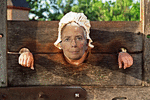I'm giving up on the Brexit crowd who are experts on all areas including being experts on other experts. They've got their heads so far up their rear ends they can't see reason or logic. Enjoy the limelight. More liike darknight where your minds are but sooner or later you'll have to come out of that hole you find your selves in.
Is the EU really undemocratic?
Unlike the United Nations or the World Trade Organisation, only democracies can join the European Union. In theory, EU member states that slide back on democratic standards can be sanctioned, although this is easier said than done.
But aren’t a bunch of unelected bureaucrats in charge?
Actually, they aren’t. When people talk about “the unelected bureaucrats of Brussels”, they usually mean the European commission. The commission is an organisation like no other: more than a civil service but less than a government. Composed of 28 commissioners – one from each country – the commission drafts, enforces and monitors EU laws. But it does not pass laws.
That does not mean the commission is not powerful: the EU competition commissioner can block mergers and fine multinational companies staggering sums computer chip maker Intel was fined a record €1.06bn (then £852m) for anti-competitive practices. But these powers rest on treaties and laws decided by EU governments. Similarly when it comes to striking trade agreements, the commission’s powers are restricted. The EU trade commissioner negotiates on a mandate drawn up by EU member states – the opening of controversial TTIP talks with the US was based on a unanimous decision by EU member states. If TTIP survives, it can only enter into force with the approval of governments and the European parliament.
The commission cannot foist laws upon EU member states. For example, the commission spent eight years trying to get EU countries to agree to a law on cleaning up Europe’s contaminated soils, but eventually withdrew the bill in the face of an immovable blocking majority, which included the UK.
Who really makes laws?
EU laws are agreed by two institutions: the council of ministers, comprising ministers from 28 EU governments and the European parliament. The European council, EU leaders meeting for regular late-night summits, plays an increasingly important role in setting the agenda.
Isn’t Britain always being outvoted?
One of the biggest gripes of Eurosceptics is the extension of qualified-majority voting, which allows the British government to be outvoted. A swathe of EU policies are now decided by these weighted-majority votes, such as environment, agriculture and transport. More sensitive policies, including tax, defence and foreign policy, have to be agreed by unanimity.
Under QMV, a law passes if it is backed by 16 out of 28 countries that make up at least 65% of the EU population. The UK has 13% of the EU population, so gets a 13% vote share.
Research by the London School of Economics found that the UK was on the winning side 87% of the time between 2009-15. So the British government does have to accept some EU decisions it didn’t vote for. One of the most high-profile losses in recent years, was when the chancellor, George Osborne, was outvoted on an EU law to restrict bankers bonuses. In this case, more than three quarters of the British public, including 68% of Conservative voters, supported the EU proposal.
That bit in red is telling isn't. Do Brexiters know what feck they are talking about. Does Theresa believe her own BS about a social and corporate responsibility?
Tory party (Osborne) want's to continue with the inequitable skewed rewarding of fat cats. Previous charts show the distribution of income difference clearly.
UK workers get turned over and the very people who are doing it are lying to all Brexiters. Especially to men of Northern England. Is this not visibly clear to you all?
Fwiw, that UK being on the winning side is higher if one goes back further prior to 2008, because there also is the financial transaction tax votes which UK opposed.
You know who their leader is, that blabber mouth Nigel F, who thinks a Brexiter should have been appointed to replace Sir Ivan Rogers effectively politicising the Civil Service.
Same argument for the EU Commissioners and law making process by MEP's appointed by member countries political parties in proportion to respresentation in their own parliaments.


